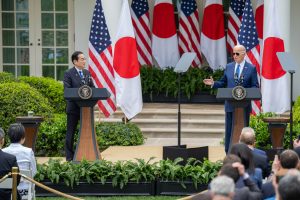Japanese Prime Minister Kishida Fumio announced this week that he will not seek re-election as the ruling party leader in September, paving the way for a new Japanese premier. Kishida was the second Japanese prime minister to follow Abe Shinzo, whose nine-year tenure was the longest among the Japanese prime ministers. After Abe stepped down in 2020, his immediate successor, Suga Yoshihide, lasted just 384 days as premier, and now Suga’s successor, Kishida, is leaving after three years. Such frequent changes of power do not make for stable or strong policy, particularly when the world is, according to U.S. President Joe Biden, “at an inflection point.”
Kishida explained his decision by saying that politics cannot function without public trust and asserted that as the leader of the Liberal Democratic Party (LDP) he felt the need to take the responsibility for a political slush fund scandal. The misuse of campaign funds, or rather, unreported income from political fundraising events, involving some 970 million yen ($ 6.5 million), also led to the indictment of several lawmakers and aides.
All of this led Kishida’s approval rating to plummet to record lows around, or even below, 20 percent since the beginning of 2024. To address this, he removed ministers and Cabinet executives and declared his intention to dissolve LDP factions, including his own. However, the irony is that these moves not only failed to establish a fresh start, but also generated bitter resentment against Kishida within the LDP. This double hit forced Kishida to resign to make way for a new general election candidate.
Based on Kishida’s flagging approval ratings, the public is focused on this deplorable, yet seemingly minor, financial scandal, one that did not implicate Kishida himself. In so doing, the Japanese public is apparently content to ignore the totality of challenges that Japan faces and the achievements of the administration in terms of foreign policy.
Kishida, who during the Abe administration became the longest-serving foreign minister in modern Japanese history, has been instrumental in advancing Japan’s rapprochement with South Korea, which has always proceeded in a tortuous two-steps-forward, one-step-back manner. Furthermore, Japan has been an uncharacteristically leading force in providing support to Ukraine. The G-7 summit in Hiroshima was noteworthy for its success in uniting support for peace. Japan has also broken new ground with its partners, including strengthening ties with Australia and the U.K.
But perhaps most important of all was Kishida’s bold address to the joint session of the U.S. Congress, where he expressed his concerns that the United States was losing its leadership in the world, in turn threatening long-term security treaties, organizations, and systems. By Japanese standards, this critique was profound and fearless, and yet, Kishida’s diplomatic skills enabled this important message to be delivered without causing offense and in a manner that left its audience openly receptive.
Kishida’s successful visits to the United States over the years elevated Japan’s foreign policy contribution beyond the polite but essentially purposeless diplomatic discourse of old. Since World War II, the U.S. has been Japan’s only ally. Yet the Japanese approach to the alliance was always one of meek subservience. Under Kishida, the bilateral partnership evolved into one in which a friend could criticize another – and seek to dissuade the U.S. from choosing a potentially perilous course.
Since Biden stepped down as the Democratic Party’s candidate, the November presidential race in the United States has become wide open and potentially even now favors the new Democratic candidate, Kamala Harris. Certainly, Japanese policymakers are sensing relief as the prospect of another – and potentially even more unstable – Trump administration appears increasingly less likely. However, a Harris presidency is still far from assured, and moreover, it is unclear what shape a Harris foreign policy doctrine would take. Therefore, whether we see Harris or Trump assume office in January 2025, Kishida-style diplomatic skills and consistent national security focus will be much needed.
In short, Japan will need another international statesman as prime minister. The jury is out as to whether Kishida’s successor, whomever that may be, will meet this high bar.

































